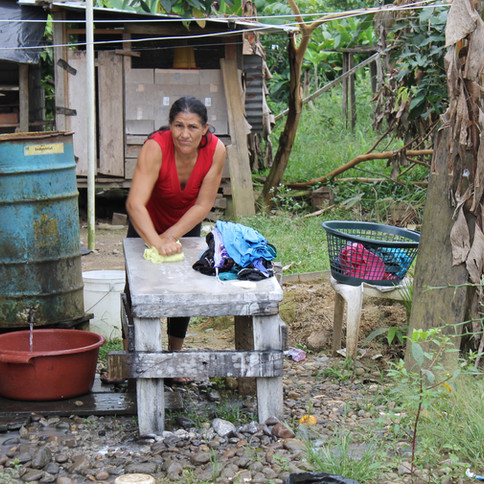When Kichwa women lead
- Darrell Adams
- Feb 13, 2018
- 2 min read
Indigenous women in Ecuador exist within a patriarchal system
that largely defines their experience as women. If you are a
Kichwa woman, you’re going to follow traditional roles in the
household, preparing food, raising children, and serving as water
managers. Stepping beyond that is subconsciously out of the question.
Kichwa women identify themselves as being closed. They
have more solitary time in their house taking care of their children
than interacting with community.
If you are a Kichwa woman, much of your life may be spent
making chicha, a drink made of yucca. The drink ferments as it
ages so you may also have to deal with the domestic violence
that is common from intoxicated partners.
You may marry at the age of 14 and raise 12 children within your
lifetime. Your life is domestic.
So when an indigenous woman comes to your door and wants to
tell you about safe water, using toilets, and washing your hands,
you may be curious. Indigenous women don’t speak up. They
stay in the home.
Lucilla, however, is different because she has a job working with
our organization, MedWater, a group that engages community
members to train other communities on safe water management,
toilet construction, and good hygiene practices.


Women in these communities often ask her: “You’re husband
doesn’t mind that you’re speaking out?”
“No,” she says, “he doesn’t because he’s right here working with
me.”
Lucilla and her husband Jaime work as a couple. Of course it’s
safer to go as a team. But it also opens up a stream of
conversation on gender roles and WASH management.
The majority of communities in this area do not have toilets nor do
they have access to safe water. Water is commonly piped in from
an unprotected spring. Bringing materials in for construction of
infrastructure like toilets has been facilitated only by the recent
development of roads created by the oil industry.
In 2014, MedWater began to build it’s network of WASH promotion through partnerships with communities, local government, and medical teams. With the establishment of the organization, a priority was placed on ensuring that gender balance was achieved on community water councils and an equal number of women and men were hired as community health promoters.
Some of the distinct benefits of engaging women as health
promoters is largely due to the distinct differences that gender plays in Kichwa daily life. Without engaging women, arguably more than half of the population would not benefit from water and sanitation education due to the fact that children fall in a population influenced more by their mother’s actions in the home, than by their fathers.
Some highlights associated with this engagement have included
leadership by women to promote toilet construction in their
community. As care takers of their sick children, women are more
intimately aware of the impact that a toilet may have on diarrhea
and worms.

As an organization, MedWater has found it invaluable to engage
women in WaSH training and management. By instituting policies
to ensure that women like Lucilla are engaged in WASH leadership roles, programming can be significantly more affective, and can reach a larger portion of the community that we serve.






































Comments